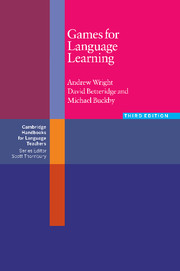5 - Mainly reading
Published online by Cambridge University Press: 13 March 2010
Summary
We normally read in order to get information that is relevant to us. Our practical reading skills are sponsored and developed by this aim. The games in this section involve the learners in looking for and responding to meaning rather than responding to a text in a formal way.
The games call for a manifested response, that is to say, a response in which the learners do something to communicate to others their understanding, their feelings and their ideas, rather than just a response that is private.
Two important skills are concentrated on, namely skimming for gist, when the learners find out at speed what content a text contains, and scanning, when they search a text for some particular item in it.
DO: MOVE, MIME, DRAW, OBEY
What's my mime?
Familydo: mime
Language Showing understanding of a text by miming it
Skimming and scanning a series of texts to find one corresponding to actions being mimed
Scanning a text for a particular language point
(optional) Writing texts that focus on actions (with special attentional to verbs and possibly combinations of verb tenses)
Preparation Display on the board a list of sentences that express actions which could be mimed. Alternatively, give a photocopy of the list to each learner.
The sentences could be written by the learners, or you could write them yourself. When writing or choosing sentences, you may wish to favour ones that not only offer practice in skimming and scanning, but also allow revision of a particular language point.
- Type
- Chapter
- Information
- Games for Language Learning , pp. 80 - 93Publisher: Cambridge University PressPrint publication year: 2006



